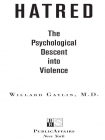Hatred, Willard Gaylin [best ebook for manga txt] 📗

- Author: Willard Gaylin
Book online «Hatred, Willard Gaylin [best ebook for manga txt] 📗». Author Willard Gaylin
Let me clarify what I am saying. Of course I am distressed by the agony and injustices that have occurred in modern-day Africa, the starving in Somalia, the butchery and enslavement in the Sudan, the kidnapping and maiming of thousands of children in Sierra Leone, the slaughter of innocents in Rwanda and Burundi. When I witness these tragedies on the faces of real people through the pictures on television, or in my imagination while I am reading the newspaper accounts, a true sense of grief overcomes me. It is not simply an intellectual response. But this grief has a pathetically ephemeral existence. Although I may maintain my intellectual involvement and moral commitment through political and relief activities, my true and enduring emotions will not be the same as the pain caused by my everyday awareness of the injured child with whom I share my life. The most refined of consciences, the most overdeveloped capacity for guilt, will nonetheless rebuke our logical sense of justice and override our sense of proportionality when we deal with the suffering of those we know and love—our own—in comparison with the suffering of some distant others.
We are grieved by the everyday, by what we see, and what is close. The priority of the news media in focusing on local over international news is a testament to the interests of their audiences. More true grief and tears are generated by the discovery of the body of a murdered child in the neighborhood than of hundreds of children killed in floods in Bangladesh. The nearby disaster has more meaning, even though lesser than the distant one. It is not a new idea. Hume observed more than two hundred years ago, “Pity depends, in a great measure, on the contiguity and even sight of the object.”53 And certainly the capacity for television to bring disaster into our very homes has expanded the population of those with whom we can identify.
Although proximal identification may not require the physical proximity to or sight of the individual that Hume suggested, it certainly requires something comparable, a clearly defined kinship, for example. Such kinship may allow us to identify with people we have never known. We can identify with those in a future too far for us to envision and back to a past we never experienced. The chaotic and random killings in Northern Ireland, taking the lives of hundreds of innocents, inevitably touched the hearts of Irish Americans who had never been in Ireland more than the loss of a hundred thousand lives in Iran. A terrorist bomb exploded in a bus full of Israeli children feels like a personal blow to an American Jew who has never been to Israel.
These ethnic and religious identifications—with the limitation of empathy they suggest—can be seen as deriving from important survival patterns built into our genetic matrix before the emergence of modern culture. Proximal identification may seem irrational and unjust in our current period, when we are approaching a global culture, but it was a biological necessity at an earlier period. Without it we could not have saved the species in those days of limited awareness of space and even more limited vision of the world as a whole. We preserved the species by each protecting his own. The units of survival in prehistoric times were much smaller than those of today. There were no nations, and there was no consideration of the universality of mankind. There were only family clusters, no “family of man.” Survival of the species, particularly through the protection of the vulnerable young on whom the future rests, demands an overvaluation of the needs of those young who are our own specific charges.
We can see that among herding animals, the herd is best protected when the antelope protects her offspring, and hers alone, from the marauding lion. If every mother were concerned about all the young—the general welfare—none would survive. The propensity of human beings to overvalue their own is part of the biological inheritance we share with lower communal animals.
Having dealt professionally with human suffering on the most intimate level in my work with patients, I know that true empathy, producing real compassion and personal suffering, remains a proximal quality. Those rare individuals who have hearts that bleed indiscriminately for humanity in general are likely to have eyes that shed few tears for individual men and women.
The greatest protection against group hatred is the ultimate inclusion of the hated contingent into the population with which we identify. In other words, expand “proximal” identification to larger and larger constituencies. Part of the tragedy of the African states is that statehood was established arbitrarily under European colonialism. As such, the “states” were never identifiable or recognizable by the natives who were its presumed members. The result was that identities were fixed to relatively small units. When there was unification, it was through religion, which, as will later be discussed, managed not only to enlarge the community of identifying people but also to define a larger enemy population.
While not denying the existence of subcultures in the United States, with their multiple divisions into “us” and “them” and the consequent prejudices, what is still amazing is that we have managed to forge a national identity among widely diverse populations. We do have an American identity, and when an American naval ship, the USS Cole, was attacked by terrorists, we responded in unity with appropriate grief and anger, independent of whether the victims were black or white, Christian or Jew, northern or southern, rich or poor.
We have made progress. Aided by the shrinking world of modern travel and the instant awareness made





Comments (0)